
|

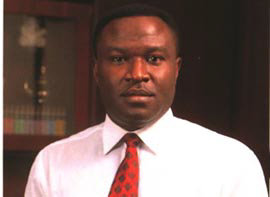
Read our exclusive interview
 |

 MERCHANT BANK OF COMMERCE LTD MERCHANT BANK OF COMMERCE LTD
"The Dynamic Bank"
Manager:
Mr. Ike Nwabuoku , Managing Director
Contact:
Plot 697,
Amodu Tijani Street
Victoria Island
P. M. B. 12827
Lagos
Telephone +234 1 2624029 - 31
+234 1 2624153 -54
Facsimile +234 1 2620860
Email ike@mbcomm.com
Website http://www.mbcomm.com
|
 Strategy Strategy
 MISSION STATEMENT MISSION STATEMENT
" A well trained, highly motivated and focused team of professionals is indispensable in any banking relationship"
At MBCOM, we have put in place the right team to deliver distinctive, timely and personalised financial services to
our choice and discerning clientele wherever they are located"
Project Finance
Merchant Bank of Commerce is a niche player with a strong presence in the area of project finance. Our involvement in this area derives from our strategic business focus and our commitment to contribute to the socio-economic developments of the nation.
Our choice area of project finance include multilateral institution financed projects, energy sector related projects and government projects sponsored by institutions such as the Petroleum (Special) Trust Fund amongst others.
In these key areas, we have distinguished ourselves by the depth, breadth and efficiency of the services we render to our clients. We are proud of our modest achievements in this area and strongly identify with the socio-economic benefits our participation in these projects has on the economy.
In water rehabilitation, several projects have provided clean water to the numerous remote communities of the country thereby improving health standards and invariably life expectancy in these communities. While in the energy sector, in line with the government indigenisation policy, we have played a critical role in transforming several previously small to medium scale indigenous engineering companies into major players in the oil and gas sector.
We have put in place, in-house, a strong credit process, skilled personnel and relevant structures to ensure our continued dominance in this area of project finance.
Our goal is to provide skills, improve efficiency in our processes, and develop extensive goodwill and technical know-how to become, besides financiers, partners to our clients in this area of core business
 INTERVIEW WITH INTERVIEW WITH
MR IKE NWABUOKU
MD/CEO MERCHANT BANK OF COMMERCE LTD
February 11th 1999
FORBES: I would like you to give us a brief historical background of the bank and also where you stand in the national market and also your role within it.
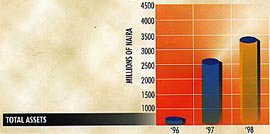
NWABUOKU: Merchant bank was formed about eight to ten years ago. It was actually in a state of distress before 1995, when my team took over management of the bank. It is essentially a merchant bank, although we hope to go commercial .I am going to talk about that later. We took over the bank in June, July1995, and brought into the bank new a management, restructured and re-capitalized the bank,. We had a huge job to do at the time. Before then, all the figures were negative, net worth was negative, revenue reserve was negative, all the ratios that you know would make a bank what it should be, were negative. And we thought we were going to do it in four or five years. But interestingly we did it in less than two years;
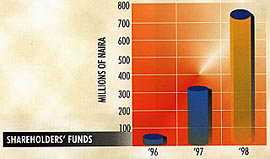
a complete turn around was achieved. So, at the point that we achieved the turn around, we tried to define the relevant issues in its typical form especially in terms of focus, business focus, in terms of where we want to be, what we want to do, in five years. So we focused essentially on the energy sector, multi-lateral institutions, of finance. These have been the major areas of the our concentration.
FORBES : Could you tell me a little bit of yourself, how long you have been a Managing Director and your role in the company?
NWABUOKU: Yes, em, from inception, I mean from the time we had a new management in July 1995, I have been the Managing Director of the bank. I worked with the International Bank (IMB) before then, which was at one point part and parcel of the International Bank of Chicago.
FORBES: The government says it is implementing its privatization program. How is the Merchant Bank of Commerce participating within this program?
NWABUOKU: We were playing a role as financial advisors. We are one of those that were selected for interviews, about three months ago. We did quite well at the interview and we are hopeful that some of the mandate will be given to us, shortly.
FORBES : Do you think that privatization the program is going to be a success in Nigeria?
NWABUOKU: Yes we have a lot of faith in it, its going to be a success. I think the only slight problem we have here is going to be time constraint. But, I still think that at the end of the day we will achieve more than 70% success, given the time frame. If we had a longer time of course, we would have a totally successful outing.
FORBES : And of course the privatization program is in context within Vision 2010. How is it going to go on since it was implemented and within the expectations of Vision 2010.
NWABUOKU: Well, with the new government in place, I mean the government of Abubakar, everything is looking up. We were moving at a slow speed before the new government came in, but we think that with Abubakar things are moving rather fast, and I think that they have this objective of making it irreversible before they leave.
That makes us believe that the government that will succeed Abubakar will continue from where he stopped. In any case, most Nigerians want it we know, those of us in the corporate world know that it is the only way out for us right now, we also know why there have been delays I mean those are logical reasons. Now I think we have gotten to the end of the road, government and the people of the country know that we do not have an option.
FORBES: Em, the minister of Finance, Mr. Usman in his own speech told us that the Banking sector, financial sector, is going to essentially act as the gateway for foreign investment in Nigeria. How does (your) bank plan to accommodate these foreign investors?
NWABUOKU: First and foremost, we must align with some institutions abroad to do this. As a matter of fact that was one of the key points at the time of the interview, the panel wanted to know how associated we were, I mean what is the strength of those outside the country to facilitate this process.
FORBES : That is one of the criteria mentioned…
NWABUOKU: That’s right. And every other institution that was present there had to make a similar presentation, because there is no way you can you can do it alone. You need some outside help, some partnership.
FORBES: Where is your outside help? Who are your
partners in the USA?
NWABUOKU: Yes, When you say partners in abroad,
you mean one of the financial organizations, somewhere
in Britain
... right? Government?
FORBES: Some could be individuals? a bank or
partner or a kind of it? bank partner or kind of
it.?
NWABUOKU: Not yet, we are going to go into all that
looking for partners, banks, other investment /
banking institutions or other institutions that
have reason to do this kind of exercise.
|
FORBES: When?
NWABUOKU: Very soon, as soon as we get the mandate because we have enough time to finalize this arrangement We can at best say right now that these are the institutions we think we hook up to. As you know right now it is a competitive bid more or less, every bank in Nigeria, that is worth its salt wants to be part and parcel of this and we are also in competition for the contacts and the institutions that we have to use. We have to give out very little by way of information, because we do not want to disclose all of it; we have about 120 banks here and in fact some banks abroad, involved, so its better for us to give little by way of information what we plan to do since this is competitive, so I hope you will excuse us on that. (Laughter)
FORBES: That’s alright.
NWABUOKU: But we have clearly identified those we are going to do this with. What you are doing now is quite important because it will help obviously to spell the situation here out there especially the institutions. One the things we are trying to do as a bank is to be open to outside investment in the bank itself .We do not hope to remain a purely indigenous Institution for too long. It’s one of the items we have in our file here for the programs.
FORBES: You are trying to facilitate… em…
NWABUOKU: That’s right. Grow this institution to a point where we can now have foreign investors who invest directly in the bank, financial institutions, so that exercises like this privatization would be a lot easier for us to handle. IMB where I used to work that’s International Merchant Bank, had this relationship with First National Bank of Chicago; First Chicago owned 60% at some point, then 40% and then finally divested, when the exchange rate became unbearable for them. I know the advantages we enjoyed as having this relationship and I think we want to harness that right now because if we had that relationship before now, we would probably have a Department within the institution or within the bank off shore, abroad , to handle this with relative ease.
FORBES: So, your personal experience has shown that …
NWABUOKU: Yes that’s right.
FORBES: Well, on a more personal note,what would you say has been your greatest achievement since becoming M.D and Chief Executive Officer of this bank?
NWABUOKU: Of this Bank? Ah! That’s so broad actually
(Laughter).What I hold dearly to is the culture of this Organization, and I think everything else revolves around it. The culture that we managed to put into place, which is people - centered really, how this place is run, management style, the level of empowerment, how we have broken or knocked off some structures that tend to make an organization too rigid. Which is not typical looking at the African culture that is what I look at, and I say if I would want to walk away from here now that is probably what I will lose. And every other thing flows from that. I would like to hold on to that as one of the things I would look back and say yes, I have done it .Because when we started, we tried not to recruit people at senior levels because we wanted to groom and we did it. We have carried on that. We have what is purely ethical When we started , we tried not to…t we did not want to say, we use to do it this way, where we were coming from. In our local parlance we say, this is, em, what do you call it, " local technology"
(Laughter). We can now say this is MBComm’s way of doing it. Yeah, we have ways and means, indigenous… You see,we, em... I’ll give you an example of em, how we have done some aspects of our business in terms of ,sorry, we are moving away now from , you know, the culture of the place. We are moving into how we do business . We , in terms of investment, we tend to go into areas where the big banks , the very big banks get into and then in terms of flexibility which you can get from an institution, we still enjoy the benefit of being one of these medium – sized banks. The big banks cannot have that flexibility in terms of volume, the volumes that we do, the medium - scale banks cannot cope. So we are enjoying some niche there. But we can be that flexible because of the type of culture we have, how we do things as a team .We have a very tight team. If you like we tell you all that we do here, if you are coming from another bank, if you take it to your bank it might not just work.
FORBES: So, that’s the Nigerian way of working?
NWABUOKU: That’s right.
FORBES: As a final question, what will be your message to our 4.5 million readers in the US?
NWABUOKU: One, Nigeria is ready for foreign , direct investment. Secondly, the banking sector is much more developed than you can ever imagine from outside this country. So it’s an area, that deserves a lot of attention and credibility. So, investors coming in and dealing with banks, you have very little to worry
(about) as long as they go about it through the right channels. Of course it has to be through the right banks.
May be through Central Bank, maybe directly with banks, maybe through Forbes, may be through me!(Laughter). This is important to note . As a point of information, and also as evidence of a complete turn around of the bank, we had to buy over another bank .
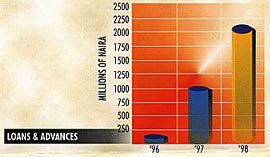
You see it was bigger than even before we came unto the scene so we bought this over, one and half years ago, the Standard Trust Bank, and they are doing quite well, They are on the point of also turning around because it was also one of the sick banks. We have been noted in the market place for turn around now. MBComm is the first in real turn around situation that you have in the Nigerian banking system. Standard Trust is probably yet to be the second one because they are on course, and in another one year…Their profits are almost surpassing those of Merchant Bank of Commerce.
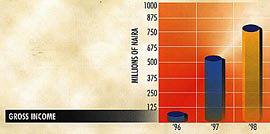
Of course the commercial banks because of all these loans, they have traditional flexibility, they have a checking system and all of that, so business is easier for the commercial banks than the merchant banks. So their profit figures are quite high and they are doing well. Right now they make hundreds of millions.
FORBES: And that is where the margin lies for commerce…?
NWABUOKU: Yes , that’s right. You see, we have a technical management agreement apart from also being the major investor in the bank. So we send the management team. The guy who was the number two man here is there, that’s Tony Elumelu, and we sent a host of others to join him and they repeated the same philosophy, the same culture and it is working. As a matter of fact, it is a bigger environment, even the buildings are bigger, if you walked across the road it is just there and we own all the structure. It is only right now that we are trying to do our building somewhere for the Head Office. This is a hired place, theirs is owned by the bank and the branches are owned by the bank. It is a very big building. And there is B.G.L, which is an investment-banking outfit, clearly for investment banking. So we have a triangular relationship. With B.G.L.
FORBES : What would be your expectation for the banking sector in the next five years, do you expect that you’d be among the bigger banks?
NWABOUKU: Very much so, that is exactly what our goal is. We have toyed with buying over two very big banks one we have dropped, the other we still have the mandate. In another month or two we should be able to determine whether to takeover that bank which has more than a 100 branches and so on. You know, in the league of First Bank, Union Bank and the rest. Right now their management is not doing quite well but we know that as soon as we step into the place things will change.
And they already have infrastructure like the other big banks, so if we do not take over that bank, they will accelerate the growth process of these institutions and we are hopeful that within five years the story will be different. But if we take over that big bank we might decide on more long- term contracts. So, that’s the plan, but we are still working on it. |
© World INvestment NEws, 1999.
This is the electronic edition of the special country report on Nigeria published in FORBES Magazine,
May 31 st issue.
Developed by AgenciaE.Tv |
|
|
|
|
|
|
|
|
|
|
|

